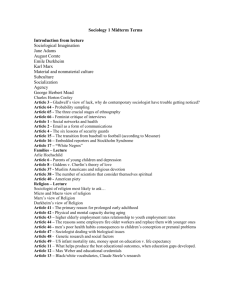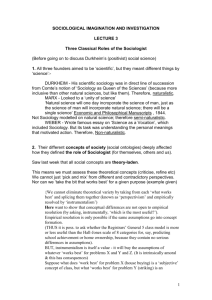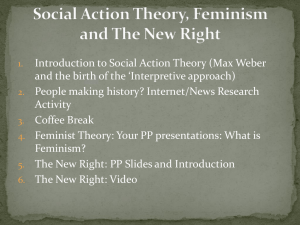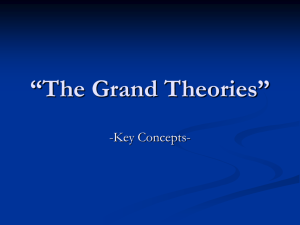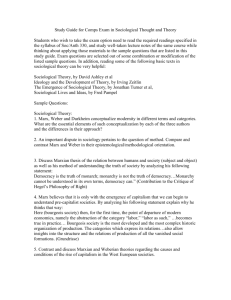The Power Trio of Sociology
advertisement
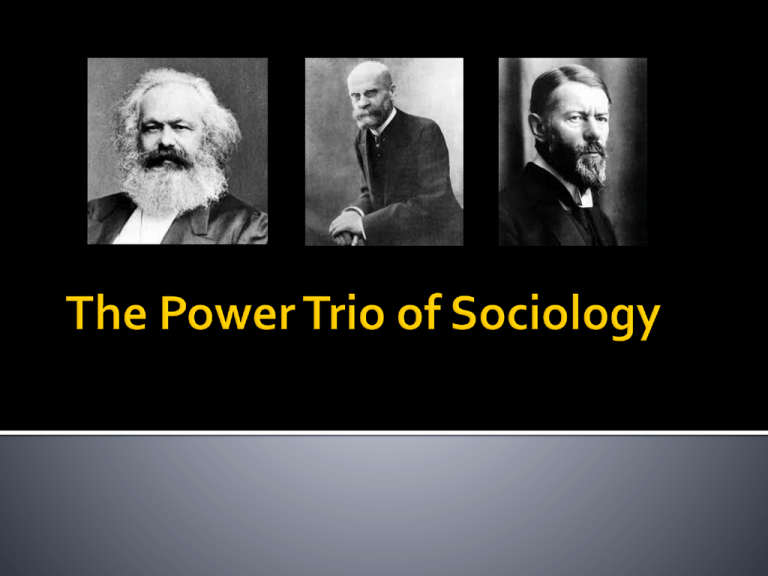
Karl Marx, Emile Durkheim, and Max Weber are three of the most important figures in sociology. Their ideas about society are still discussed today It’s important to know what they thought and said. But first....we wouldn’t have had many of these great thinkers if it wasn’t for Auguste Comte! French Philosopher Founder of the discipline of sociology. His work was influenced by the huge social changes happening in France through the French Revolution (1789-1799) French Revolution were years of upheaval within France – between social classes. A lot of turmoil and frustration around a failing economy and political power. It was a stressful time for people, life was hard! People wanted change! His focus was on positive philosophy and he developed a social theory called: Social Evolutionism. ▪ Made up of 3 stages. He referred to historical milestones to back up his theory and how society changes over time. The last stage being the most important as it related to the current state of the France’s struggle to overcome hardships. His last stage focused on positivity: the society will move out of upheaval and learn to live together, problem solve and be prosperous and stable once again. German Philosopher He believed the social world was driven by economic forces and this frustrated him a lot! He believed history was shaped by Materialism and that each stage of history was triggered by a new mode of production of goods and materials. Back then the big belief was that history was shaped by ideas (psychology perspective). Marx’ different way of thinking was met with a lot of flack! Kicked out of several countries actually! Marx was disgusted with the mode of production that dominated his time: Capitalism It upset him to see how millions of people working in hard labour jobs (fields, factories making goods) had very little to show for their work. He believed there were two social classes: the bourgeois – the wealthy, powerful people who own the factories, farmland, etc. the proletariat – the people who don’t own much and are forced to work for the bourgeois to feed their families. Marx thought Capitalism hurt everyone: He believed it was a system that trades real things (work, food, shelter) for an imaginary thing: money. He saw that social life is fundamentally focused on conflict over food, land, money, and other material goods and between social classes. Marx worked to support the Communist Party, a group that believed that everyone should resources. What do you think Marx would think of our society today? Marx thought one day we would live in a world where everyone would contribute what they were able and take what they need. Do you think this will ever happen? Why or why not? Born in France Studied philosophy & social theory. He was the first to be called a “sociologist” He was not as suspicious of society as Marx was. He believed the social world was built on cooperation among groups. Durkheim believed that our social life (home, work, play, and worship) is what defines us; what gives us meaning and purpose. He also believed the study of the social world should be based on social facts of groups rather than the individual. He believed societies are held together by shared ideas & values, which change over time as societies become bigger and more complex. Example...inventions of technologies He believed that all groups serve different functions but that together they function productively and peacefully (most of the time). Do you think Marx and Durkheim would have gotten along? Do they share much in common? German sociologist Agreed with Marx that people often fight to protect their own interests (social conflict) Agreed with Durkheim that what people consider their interests often are determined by socialization and shared values (cohesion). “Sometime we fight, sometimes we get along: the trick is to understand why and when and how? “ ~ Weber Weber believed the social world is marked by rationalization. A set of standards and rules are meant to apply to everyone. Society meant to run like a well oiled machine! People are locked in to defined roles. ▪ Webber would say that a person was paid to do a job based on their ability to carry out their duties and responsibilities, not based the individual. If he/she quit, someone else will come in and be paid the same amount for the same responsibilities. Do you think Karl Marx would have agreed with Weber’s theory of rationalization? Why or why not? Which of the three do you agree with most? Why?
